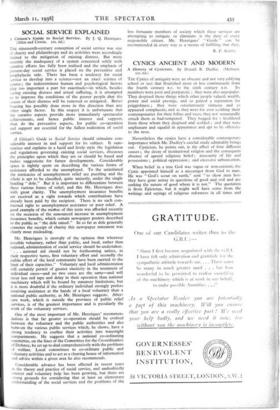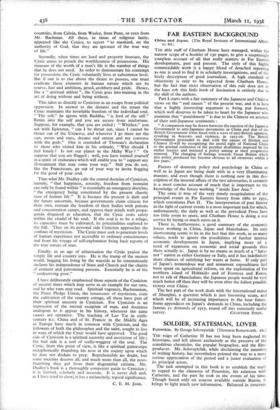CYNICS ANCIENT AND MODERN
THE Cynics of antiquity were an obscure and not very edifying school or sect that flourished more or less continuously from the fourth century B.c. to the sixth century A.D. Its members were poor and peripatetic ; they were also unpopular. They despised those things which other people valued, wealth, power and social prestige, and so gained a reputation for priggishness ; they were ostentatiously virtuous and so appeared complacent, and as they were for ever scolding their contemporaries for their follies and vices, they not unnaturally struck them as bad-tempered. They begged for a livelihood from those whom they despised and scolded ; and they were unpleasant and squalid in appearance and apt to be offensive to the nose.
Nevertheless the cynics have a considerable contemporary importance which Mr. Dudley's careful study admirably brings out. Cynicism, he points out, is the effect of four different causes ; the decay of institutional religion and the consequent absence of agreed religious belief ; insecurity of life and possessions ; political oppression ; and excessive urbanisation.
When belief in a true God was vague or non-existent, the Cynic appointed himself as a messenger from God to man. He was " God's scout on earth," sent " to show men how they have gone astray in questions of good and evil and are seeking the nature of good where it is not." The quotation is from Epictetus, but it might well have come from the writings and sayings of religious reformers in all times and countries, from Calvin, from Wesley, from Penn, or even from Mr. Buchman. All these, in times of religious laxity, appeared like the Cynics, to report " to mankind, on the authority of God, that they are ignorant of the true way of life."
Secondly, when times are hard and property insecure, the Cynic arises to preach the worthlessness of possessions. His measure of the worth of a man's life is the number of things that he does not need. In order to demonstrate his contempt for possessions the Cynic voluntarily lives at subsistence level. But if one is to rise above the desire to possess, one must eradicate those elements in human nature which are its source, lust and ambition, greed, snobbery and pride. Hence, like a " spiritual athlete ", the Cynic goes into training in the art of doing without and being without.
This takes us directly to Cynicism as an escape from political oppression. In answer to the dictator and the tyrant the Cynic maintains the inviolable freedom of the individual soul. " The self," he agrees with Buddha, " is lord of the self." Retire into the self and you are secure from misfortune. Suppose, for example, that you are exiled ; " Whither," you ask with Epictetus, " can I be thrust out, since I cannot be thrust out of the Universe, and wherever I go there are the sun, moon and stars, dreams and omens and my converse with the gods." One is reminded of Thoreau's declaration to those who visited him in his solitude, " Why should I feel lonely ? Is not our planet in the Milky Way ? " Or suppose that you are flogged ; well, you have trained yourself in a spirit of endurance which will enable you to " support any ill-treatment that may come your way." Still you do not, like the Franciscans, go out of your way to invite flogging for the good of your soul.
Thus what Mr. Dudley calls the central doctrine of Cynicism, namely, " that happiness, serenity, freedom from restraint can only be found within " is essentially an emergency doctrine, " the emergency being constituted by the present chaotic state of human life." It is because the present is dark and the future uncertain, because governments claim citizens for their own, restrain the freedom of their bodies with prisons and concentration camps, and oppress their minds with propa- ganda disguised as education, that the Cynic seeks safety within the citadel of his soul. If the soul is to be a refuge, its capacities must be cultivated, its potentialities explored to the full. Thus on its personal side Cynicism approaches the confines of mysticism. The Cynic must seek to penetrate levels of human experience not accessible to ordinary consciousness and from his voyage of self-exploration bring back reports of the true nature of man.
Finally, in an age of urbanisation the Cynic praises the simple life and country joys. He is the tramp of the ancient world, begging his living by the wayside as he ostentatiously declares his independence of State and Church and the charity of eminent and patronising persons. Essentially he is of the " undeserving poor."
I have deliberately emphasised those aspects of the Cynicism of ancient times which may serve as an example for our own, and he who runs may read. Spiritual vagrancy, Buchmanism, the Peace Pledge Union, the renascence of mysticism, even the cultivation of the country cottage, all these have part of their spiritual ancestry in Cynicism. For Cynicism is an expression of the eternal escapism of man, and doctrines analogous to it appear in his history, whenever the same causes are operative. The teaching of Lao Tse in sixth- century B.C. China and of St. Francis in the Middle Ages in Europe have much in common with Cynicism, and the followers of both the philosopher and the saint, sought to live in ways of which the Cynic would have approved. The good side of Cynicism is a spiritual austerity and asceticism of life ; the bad side is a sort of scally-waggery of the soul. The Cynic, from this point of view, is like a spiritual guttersnipe metaphorically thumbing his nose at the society upon which he does not disdain to prey. Reprehensible no doubt, but some societies deserve all, and much more than all, the nose- thumbing they get from their disgruntled citizens. Mr. Dudley's book is a thoroughly competent guide to Cynicism ; it is learned, scholarly and accurate. It is never dull and, as I have tried to show, it has a melancholy, topical significance.
C. E. M. PAD. -











































 Previous page
Previous page